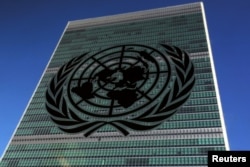New U.N. Secretary-General António Guterres says “we are facing very challenging times” which make it the right moment for the organization to “assert the value of multilateralism.”
In brief, off-the-cuff remarks Tuesday in the U.N. lobby to a few hundred staff on their first day back after the New Year holiday, Guterres, 67, laid out a glimpse of his philosophy of the direction the organization needs to take during his five-year term, which officially began Sunday.
“We need to be able to respond to the anxieties, to the concerns and to the aspirations of everybody around the world, and that’s not easy,” he said. “And let’s be honest, we are not yet entirely ready to do it properly.”
Guterres acknowledged the organization’s shortcomings and failures and urged collective engagement to change, reform and improve, including getting rid of what he called the “straightjacket of bureaucracy” that hampers the U.N.’s ability to quickly hire staff and respond to and prevent global crises.
Multilateralism in peril?
Guterres, a former Portuguese prime minister (1995-2002) and U.N. refugee agency chief (2005-2015), expressed concern the world is facing global problems that require global solutions, and said it is time to reassert the value of multilateralism, adding that “the U.N. is the cornerstone of that multilateral approach.”
But perhaps in a reference to the coming change in the U.S. administration from Barack Obama, who embraced multilateralism and re-engaged with the United Nations, to Donald Trump, who has professed an “America first” policy and warned recently on Twitter that, “as to the U.N., things will be different after January 20th.” Guterres told the staff, “we also see in relation to international organizations like the U.N., a lot of resistance in many parts of the world, and a lot of skepticism about the role the U.N. can play.”
The U.S. president-elect has also referred to the world body as an organization with “great potential, but right now it is just a club for people to get together, talk and have a good time.”
The United States is the top contributor to the U.N. budget and to its peacekeeping operations. Washington also donates significant voluntary funding to humanitarian appeals. Many U.N. observers are concerned the incoming-Trump administration could drastically cut funding to the organization at a time when it is overwhelmed with crises.
Guterres, who was chosen over a dozen other candidates to succeed Ban Ki-moon, sought to contain expectations, “I think it is useful to say that there are no miracles, and I’m sure I’m not a miracle maker.” He said the only way for the United Nations to achieve its goals is to work together as a team and serve the values of the U.N. Charter, which “are the values that unite mankind.”





